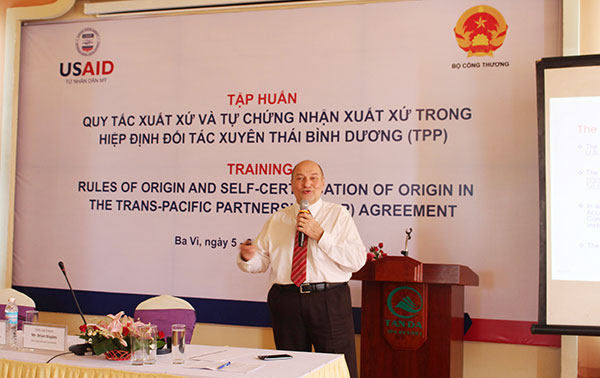New mechanism spurs trade
 |
| Mr. Nestor Scherby, Senior Advisor at Vietnam Trade Facilitation Alliance (VTFA), talking about US experience in the implementation of self-certification of origin |
Certificate of origin allows exporters to claim for preferential tariff under Free Trade Agreements (FTAs). Traditionally, businesses in Vietnam need to obtain a Certificate of Origin granted by a government’s authorised bodies to import and export goods, which is often costly and time-consuming due to rather complicated administrative procedures.
The new procedures outlined by the self-certification of origin mechanism of the TPP would replace the currently-applied Certificate of Origin (CO), and allow qualified businesses to certify their goods by themselves through readily available trade documents.
By far, such an advanced mechanism has only been introduced by the ASEAN self-certification pilot project, which Vietnam have been participating in since 2014. However, ASEAN countries have yet to come to a final agreement to include the procedure as an official commitment in the ASEAN Trade in Goods Agreement. Due to the strict requirements set by the pilot program, only two exporters, namely Vinamilk and Nestle, have been granted the right of self-certification nationwide.
“The implementation of the TPP will give firms better chances to get the self-certification right,” said Nguyen The Hoang, head of the exporting department at Regent Garment, a subsidiary of the Hong Kong garment group Crystal, with two manufacturing plants in Hai Duong province.
Hoang assessed that the new procedure would significantly reduce his firm’s expenditures on acquiring certificates of origin every year.
“We expect the annual revenue to grow by 5-10 per cent from the benefits of the TPP,” Hoang said optimistically.
In 2015, Hoang’s firm exported $330 million worth of goods, of which 80 per cent went to TPP member states.
Le Tuan Khai, export specialist at Garment 10 Corporation, shared that his company will definitely strive to achieve the self-certification rights, given that his firm currently has to apply for about 300 sets of CO per month. In 2015, Garment 10 exported over $105 million in goods value, of which 65 per cent was made up of shipments to TPP member states, including the US and Japan.
“Self- certification would save extreme amounts of time and money,” Khai viewed.
Thai Nguyen Garment (TNG)’s head of export department Nguyen Thi Minh Huong endorsed Khai’s view, saying that she had never dared hope for such an advanced regulation. TNG exports some $60 million to TPP members every year, accounting for approximately 60 per cent of its total export volume.
Also notably, the implementation of the TPP allows firms to use a granted CO set more than once, as currently regulated, during a period not exceeding 12 months after issuance, as long as later shipments bear similar characteristics as the original one.
This state-of-the-art self-mechanism will facilitate trade and investment among TPP countries, slash administrative procedures saving time and money for both the Government of Vietnam and businesses and eventually enhance the competitiveness of TPP-member states,” said Nestor Scherbey, Senior Advisor at Vietnam Trade Facilitation Alliance.
From the viewpoint of customs authorities, deputy head of the Supervision and Control Department under the General Department of Customs Le Thu assessed that the focus of verification will be shifted from pre-clearance to post-clearance, once the new mechanism is applied.
At present, the Ministry of Industry and Trade is co-operating with the USAID GIG Program to convene training workshops for local businesses, in order to introduce the potential benefits of the TPP.
Specialised in rules of origin and self-certification of origin, two parties organised an intensive training course on August 5 and 6 for more than 60 representatives from local and central government bodies and businesses. A second training course on the same topic will be held in Ho Chi Minh City at the end of this month.
The Government of Vietnam and USAID GIG Program are cooperating on a number of other reforms affecting the Vietnamese business community and organizations, to support sustainable, inclusive economic growth in Vietnam.
What the stars mean:
★ Poor ★ ★ Promising ★★★ Good ★★★★ Very good ★★★★★ Exceptional
Latest News
More News
- NAB Innovation Centre underscores Vietnam’s appeal for tech investment (January 30, 2026 | 11:16)
- Vietnam moves towards market-based fuel management with E10 rollout (January 30, 2026 | 11:10)
- Vietnam startup funding enters a period of capital reset (January 30, 2026 | 11:06)
- Vietnam strengthens public debt management with World Bank and IMF (January 30, 2026 | 11:00)
- PM inspects APEC 2027 project progress in An Giang province (January 29, 2026 | 09:00)
- Vietnam among the world’s top 15 trading nations (January 28, 2026 | 17:12)
- Vietnam accelerates preparations for arbitration centre linked to new financial hub (January 28, 2026 | 17:09)
- Vietnam's IPO market on recovery trajectory (January 28, 2026 | 17:04)
- Digital economy takes centre stage in Vietnam’s new growth model (January 28, 2026 | 11:43)
- EU Council president to visit Vietnam amid partnership upgrade (January 28, 2026 | 11:00)
















 Mobile Version
Mobile Version